The soft side of computing
Students develop poverty simulation game for local nonprofit and interactive map of campus in Software Studio course.
By Janel Shoun-Smith | 615-966-7078 |
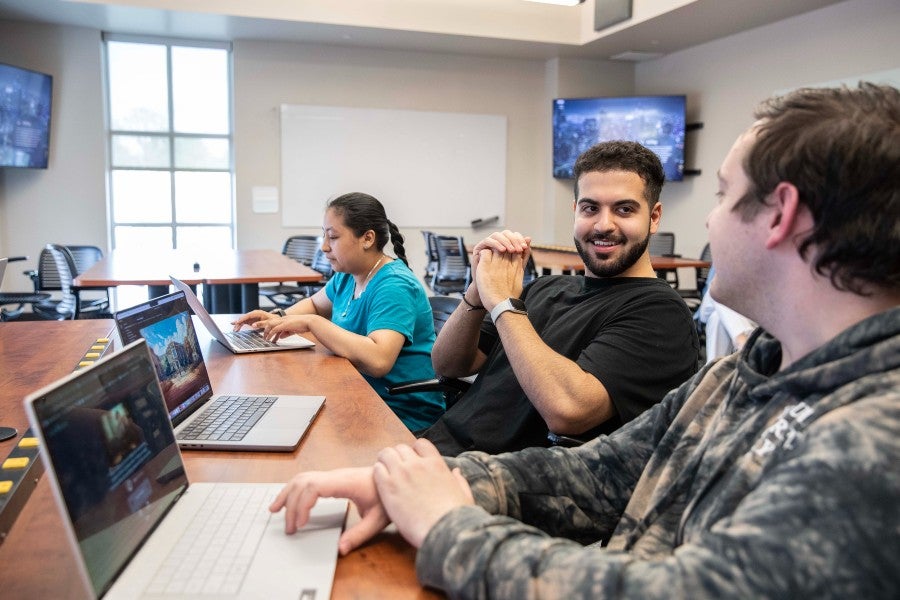
For most academic disciplines in higher education, researching and acting on the findings are just part of a future leaders’ equation for success. In fields such as business, the creative arts and engineering, knowing the “how” and “why” must be paired with the abilities to collaborate, communicate and lead a team to ensure success.
In the School of Computing, within the Raymond B. Jones College of Engineering, faculty have created a course designed to teach not only the hard skills of how to engineer software and technology, but to also teach students the soft skills of working well with clients and teams to make their digital creations a success every time.
Throughout this past year, students in the software engineering course, called Software Studio, have put their hard engineering skills to work to benefit first, a local nonprofit, Ella’s House, supporting pregnant and parenting student mothers in Nashville, and secondly to benefit visitors to Lipscomb’s campus in need of information.
These projects also stretched the students’ soft skills, such as teamwork, conflict management, communication and leadership skills as they partnered not only with Ella’s House and college faculty, but also with graduate students in the new applied artificial intelligence master’s program. The graduate students partnered to create prototypes of AI options that could be incorporated into the two projects in the future.
Software Studio is a simulated workplace environment designed to teach students the fundamentals of software engineering in a real-world setting. Students meet twice a week to work at their software development “company” called Lunatic Labs.
Throughout two years of college, 30 to 35 students each semester progress through four roles in the company: junior developer, developer one, developer two and team leader.
“Students must manage and deliver a software product in the same way they would be if they were hired in the industry,” said Steve Nordstrom, associate dean of the School of Computing. “There are no tests and no lectures. Grading is based on metrics tracking the company progress, the same as it is in the industry.”
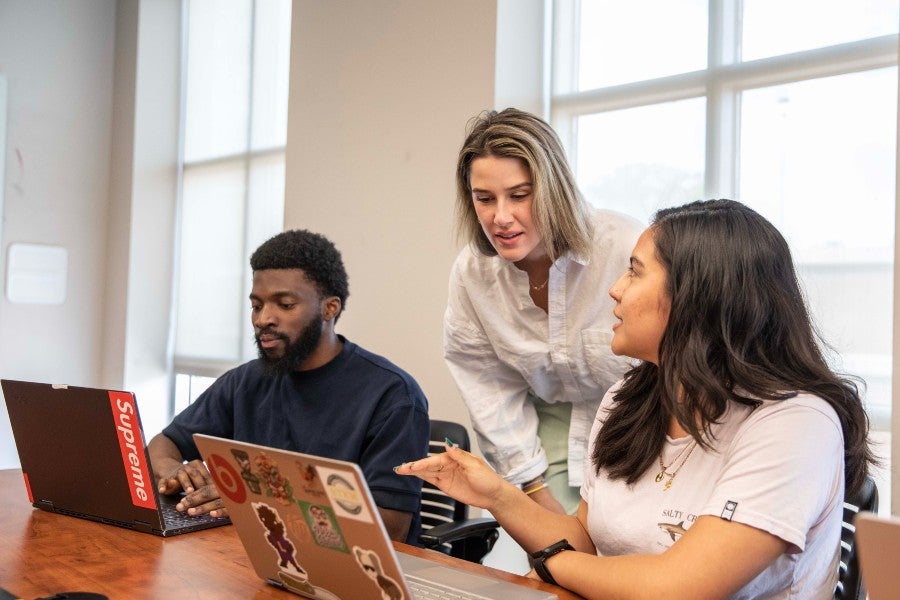
Members of the Lunatics labs computing team working with Ella's House Executive Director Elise Jenkins on the poverty simulation game.
Ella’s House Dilemma Game
In 2024, Ella’s House contacted various local colleges to propose working together to create a computerized poverty simulation game, Dilemma, intended to bring home to players the challenges that pregnant and parenting teens face.
Officials at the nonprofit had seen a similar game online and wanted to develop their own to educate donors and potential partners and supporters.
“Our organization had long wrestled with how best to communicate the invisible barriers pregnant and parenting students face,” said Elise Jenkins, executive director of Ella’s House. “While data and personal stories carry weight, we needed a tool that would immerse people in the experience—one that would allow donors, community members, and decision-makers to feel the difficult choices these students face every day.”
Dr. Susan Hammond, chair of computer science, thought the project sounded like the perfect challenge for the students in the 2024-2025 Software Studio course: a self-contained software development project with plenty of client interaction.
The game asks the player to make certain decisions, and income, mental health and the course of the game change based on those decisions. The beta version of the game debuted at an Ella’s House annual fundraiser in February, and students went along to watch users play the game and obtain feedback for revisions.
“In many educational computing programs, it is a rare opportunity that students are able to be involved with actual deployment and obtaining user feedback,” said Hammond. “Many students never have the opportunity to work directly with customers.”
“Our team at Ella’s House developed over 25 real-life scenarios, and the students didn’t just code them—they enhanced them,” said Jenkins. “They proposed a dual-impact system that tracked both financial strain and mental health decline, providing a far more holistic and human-centered lens through which to view the experience.”
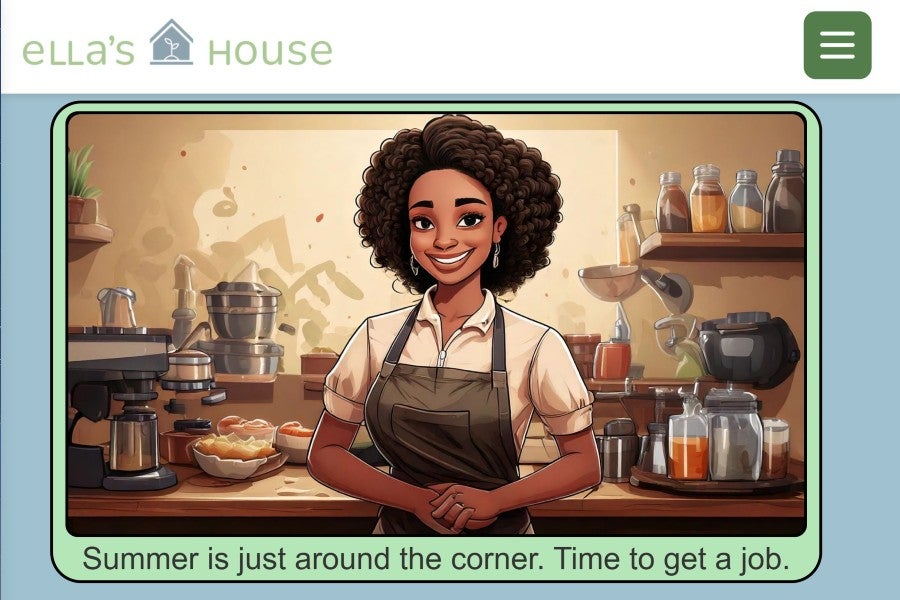
The Dilemma game leads the player through a series of decisions about which bills to pay, how to deal with health appointments and emergencies and issues with studies and tuition, among other factors for working student mothers.
According to student team leader Ramy Ismail, senior software engineering major from Nashville, his six-person team all had to learn the Javascript programming language to create the game. They met with the clients several times throughout the year and had to figure out how to take the concepts and emotions the clients desired and turn them into actual game mechanics, said Ismail.
Along the way, plenty of those soft skills were developed. The students learned that it was sometimes hard to communicate requested changes they had made in the game when it was still only available in coding language, said Ismail. They learned they could be more assertive in initiating improvements, as they understood the capabilities of the technology better sometimes than the clients.
Time management, meeting deadlines, being prepared for in-person meetings and focusing on the client’s expectations were all valuable skills the team practiced.
“Lipscomb’s Software Studio program is a powerful example of what’s possible when higher education prioritizes community engagement alongside academic rigor,” said Jenkins. “The impact of their work will extend far beyond Ella’s House—Dilemma is a tool that will educate, shift perspectives and inspire change across our city and beyond.”
To supplement the R&D work of the undergraduates, the engineering college’s applied AI students worked to incorporate an AI chat feature that could be used in the future, allowing users of the poverty simulator to talk to a virtual AI counselor and get help with their challenges, thus leading to better outcomes for the player in the game.
Students in Lipscomb’s Master of Science in applied artificial intelligence are not software engineers, but are skilled AI practitioners, trained in how to use AI to enhance existing processes in their respective field, said Nordstrom.
“Historically these kinds of interfaces rely heavily on the programming skills of a developer to connect the dots and get a usable working prototype,” said Nordstrom. “The graduate students were able to construct an interface that overcame the obstacles and, in many ways, outperformed their undergraduate software engineering counterparts.”
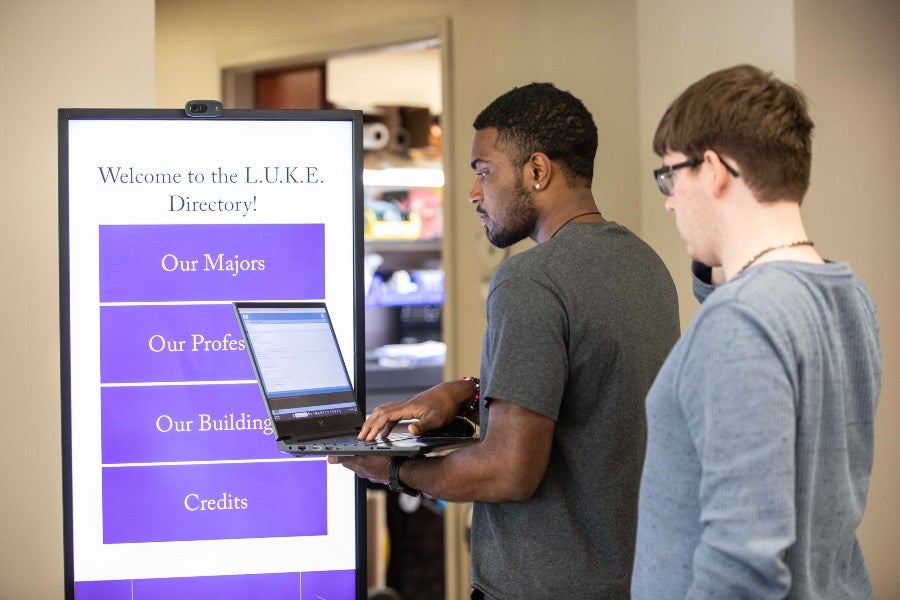
Justin T. Alexander and his student team worked on L.U.K.E. (Lipscomb University Kiosk Experience), an interactive digital map of campus and information kiosk.
L.U.K.E.: Interactive Campus Map
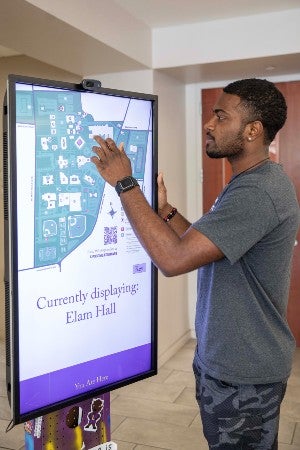
For two years, the Software Studio student team led by Justin T. Alexander, senior software engineering major from Hendersonville, Tennessee, has been working on L.U.K.E. (Lipscomb University Kiosk Experience), an interactive digital map of campus and information kiosk.
The touch-screen kiosk, which debuted in the lobby in October 2024, includes a campus map, information on engineering professors, departments and the Fields Engineering Center, trivia, a drawing pad, a video player, a camera to take selfies and a photo gallery.
While so far L.U.K.E. is only accessible in the lobby of Fields, the students worked hard to make its design something that could be easily changed out if the kiosk were moved to a new location or if more kiosks were added, said Alexander. It was designed to be just as accessible as a smart phone and easy for a newcomer to campus to figure out on their own, he said.
The seven-person L.U.K.E. team had to learn Java to implement their project and had some challenges in finding a system design that allowed all the different functions to work together on one device. The team receives logs of how the kiosk is used, said Alexander, and they are still making changes, such as changing the swipe function to more arrows and buttons to help users understand how to navigate.
The soft-spoken Alexander admitted that the project was a great growth experience for him, teaching him he has to speak up to be a strong leader. “I think having this leadership experience helped me understand at a higher level how systems are structured,” he said. “That’s a valuable skill that an AI can’t do.”
AI could, however, provide a service to answer additional questions and provide further guidance about campus. That’s what the applied AI graduate students developed for potential use in L.U.K.E.
“L.U.K.E provides some QA functionality, but the questions and answers are ‘hard-coded’ into the system,” said Nordstrom. That approach means a huge human-powered development effort or a reduced set of questions and answers, or both.
“Using a frontier AI model interface, the graduate students were able to construct an AI-based guide agent which could chat with visitors at the kiosk. Using judicious prompt engineering while providing the AI with all the publicly available information about our campus, the AI was able to answer more questions than the software engineering team could possibly account for, while also being accurate in its responses,” said Nordstrom.
“It was quite amazing to see how far non-technical students could take those challenges using current state-of-the-art AI models and tools,” said Nordstrom.